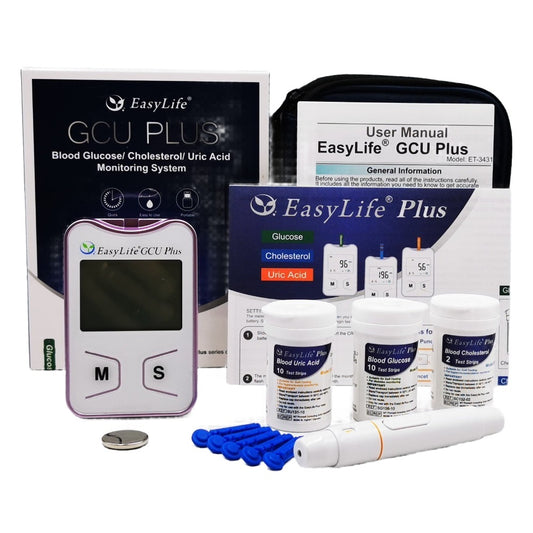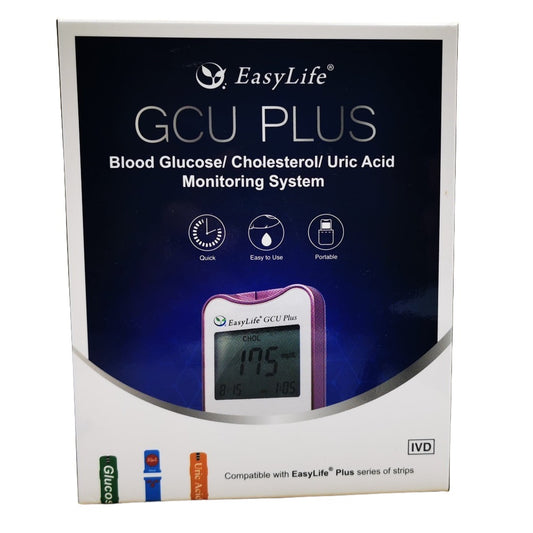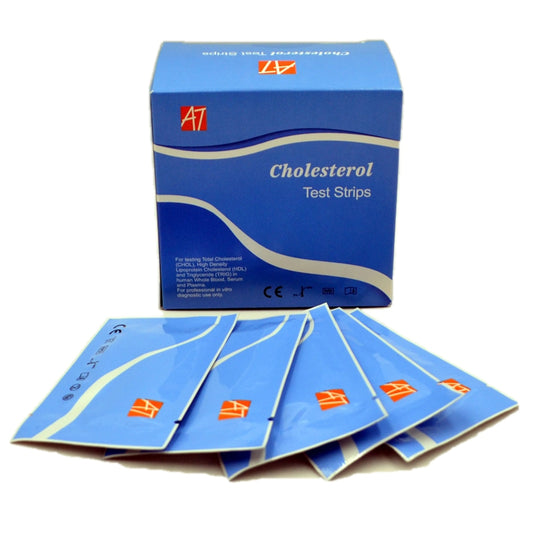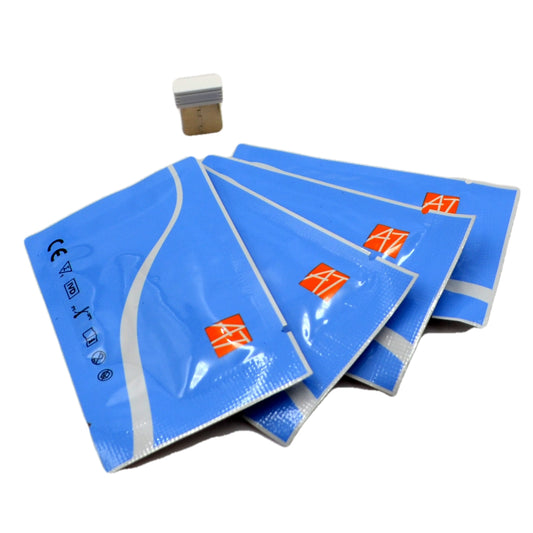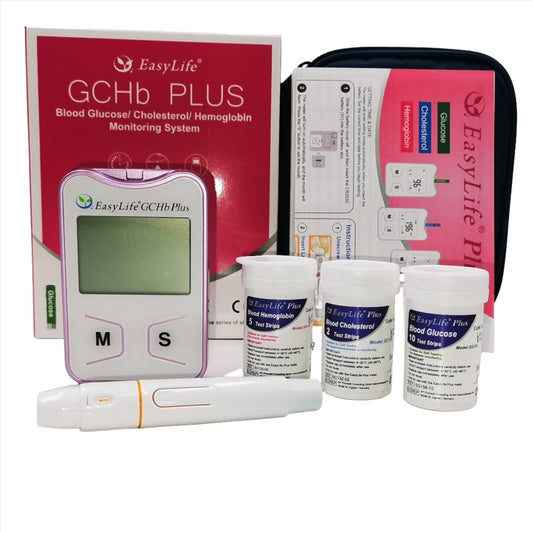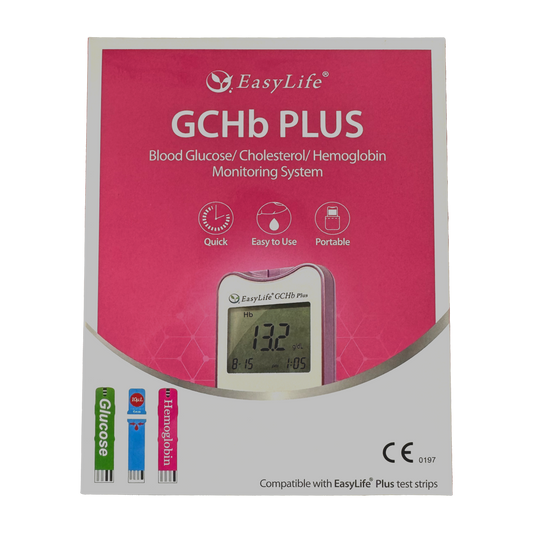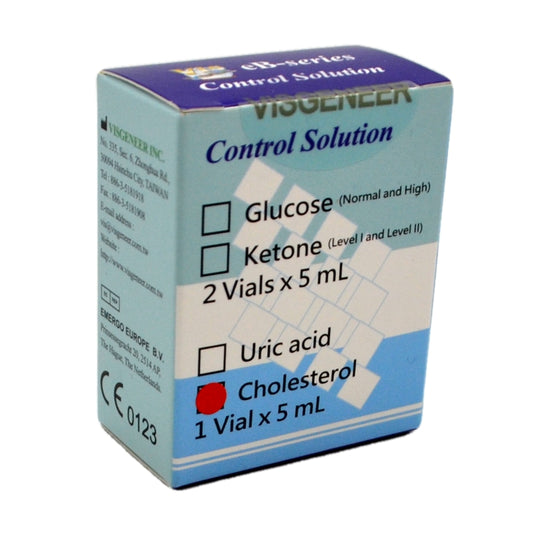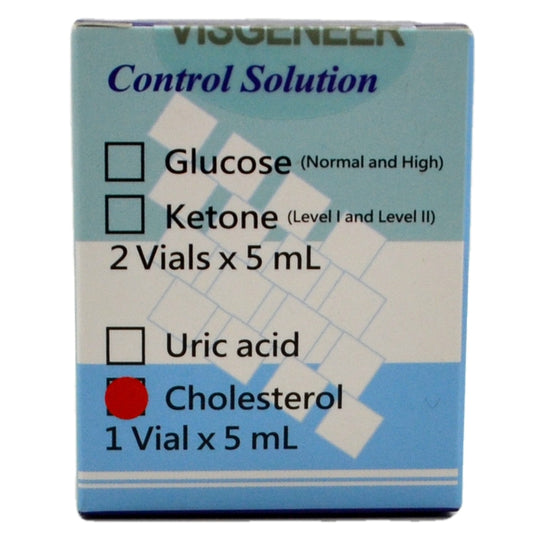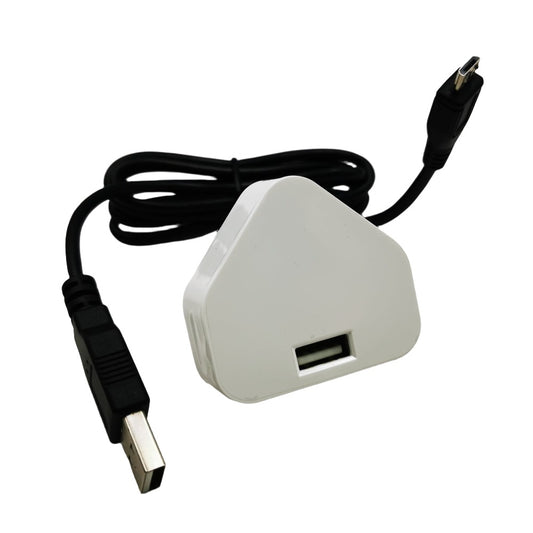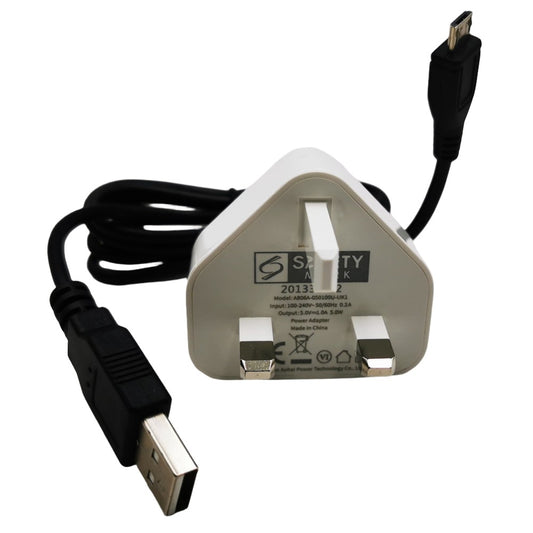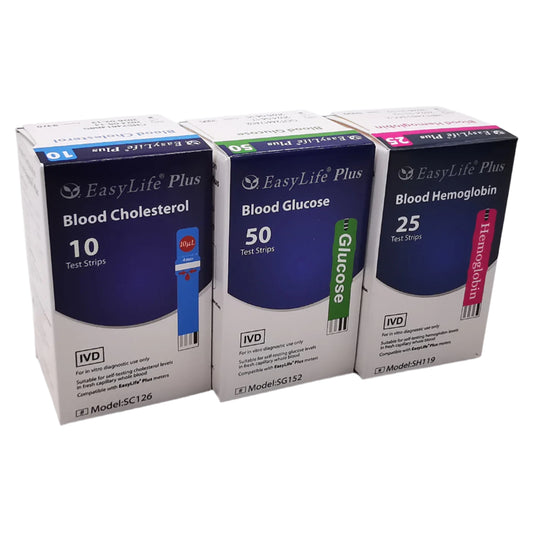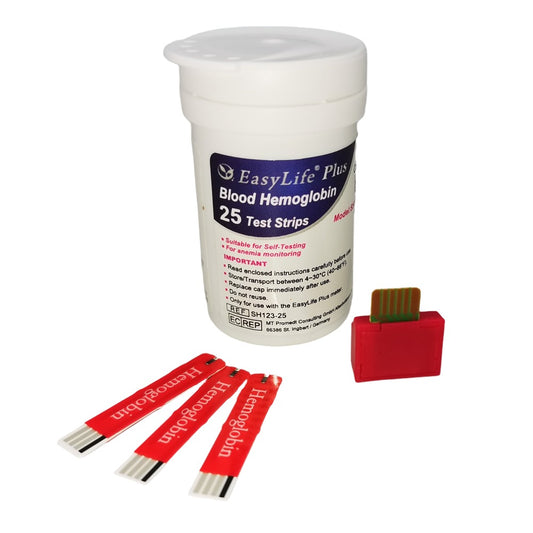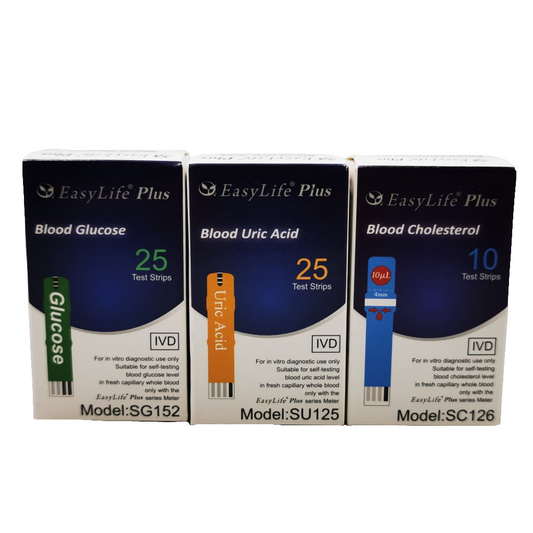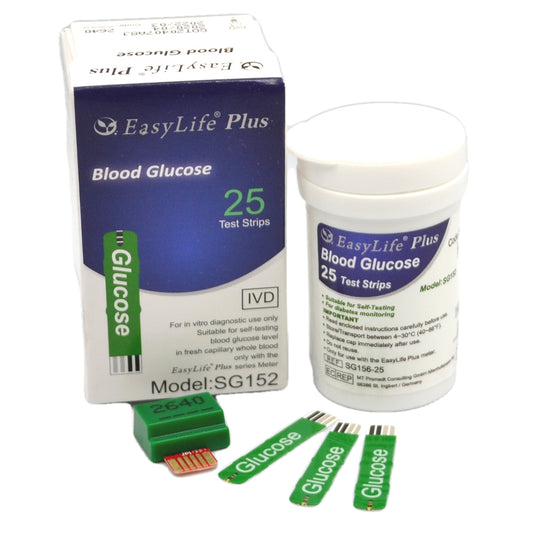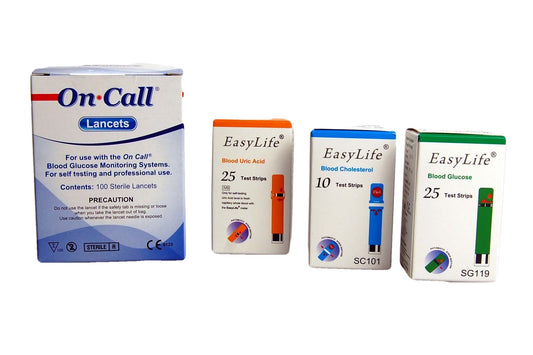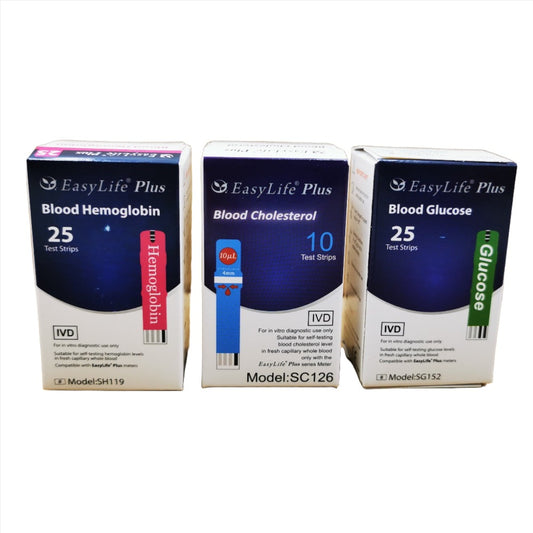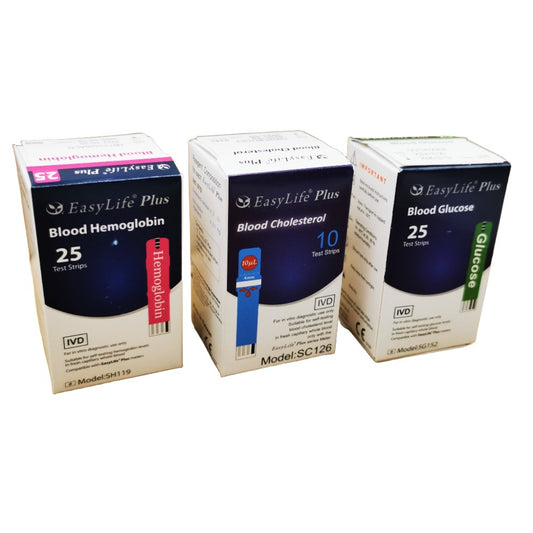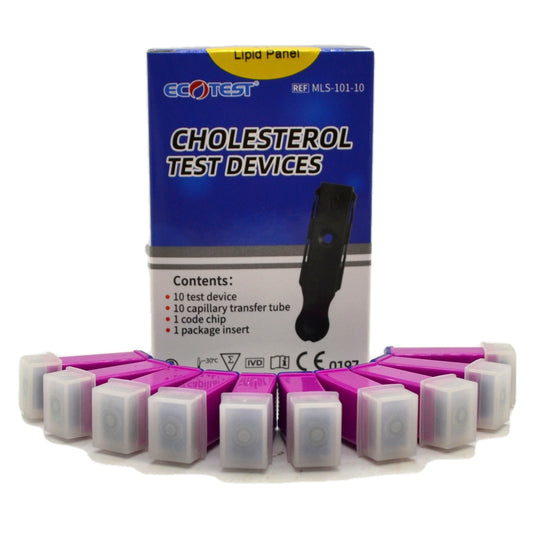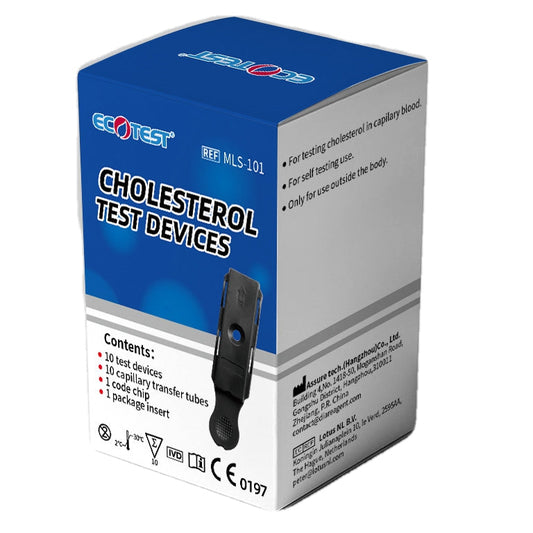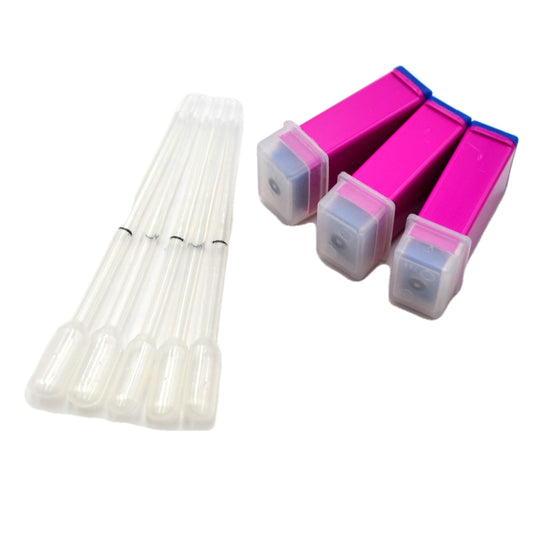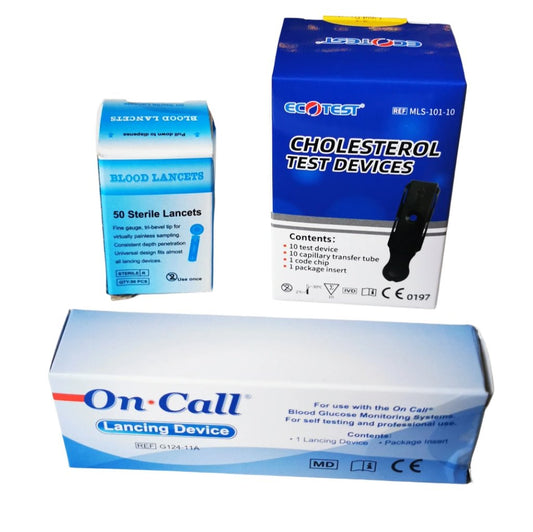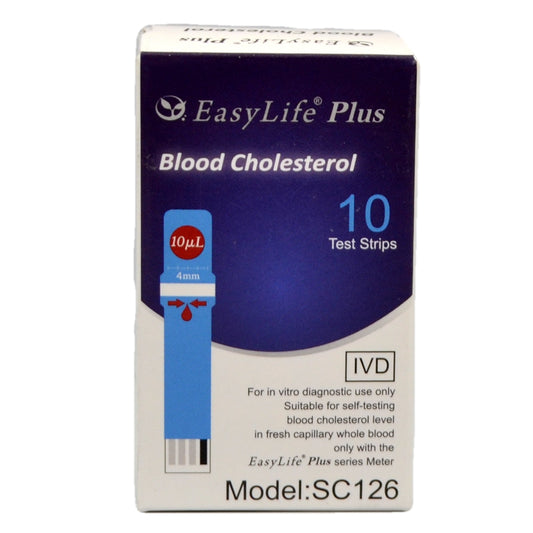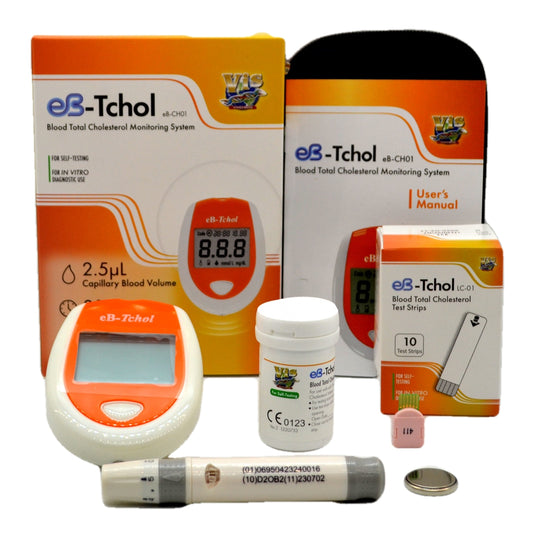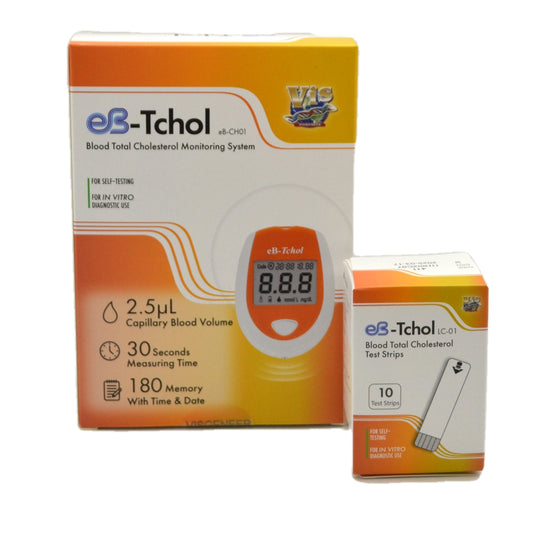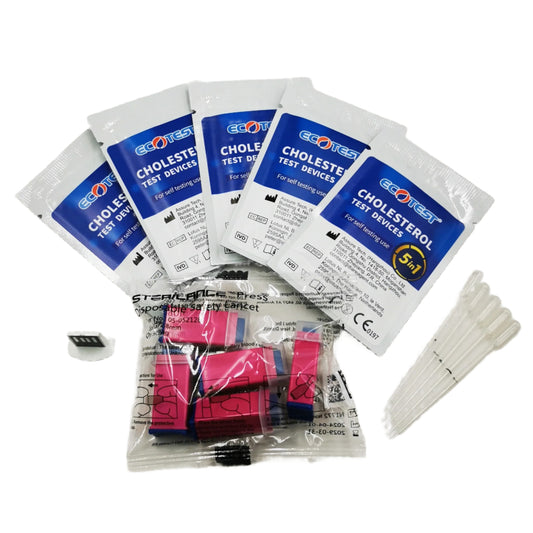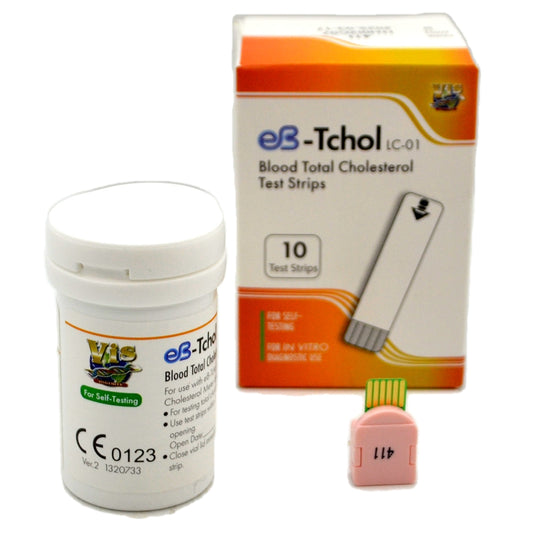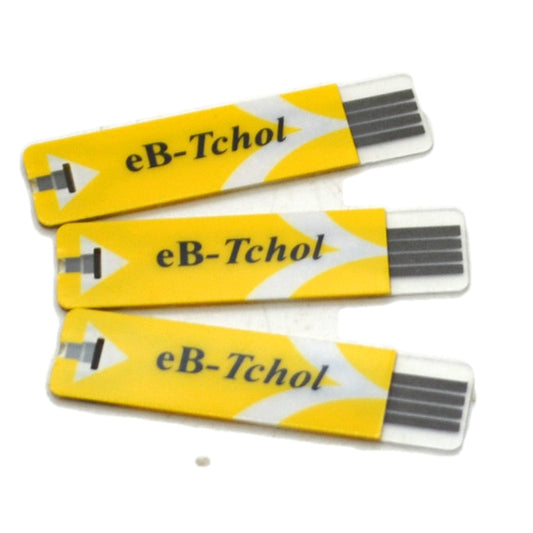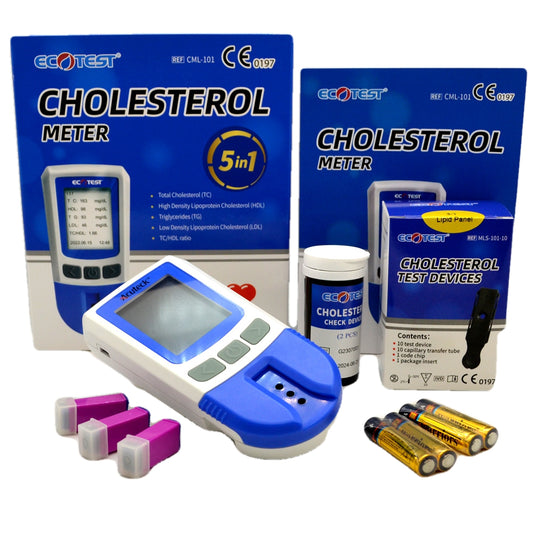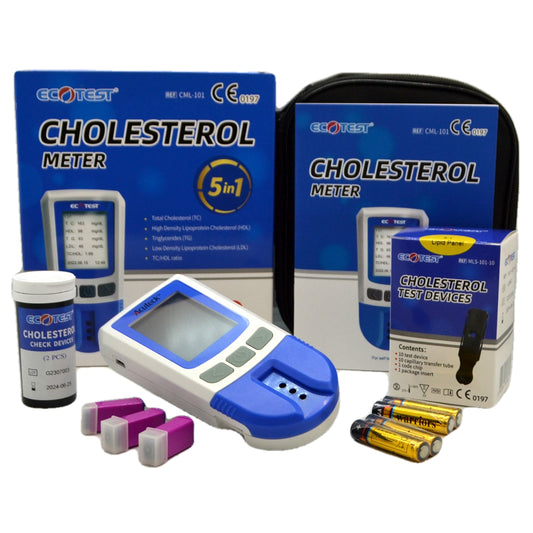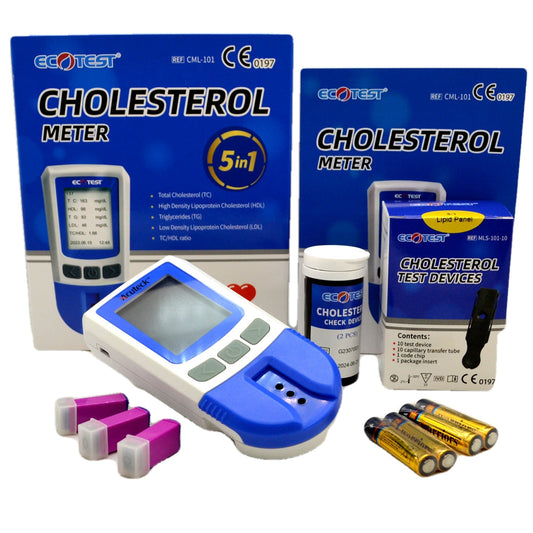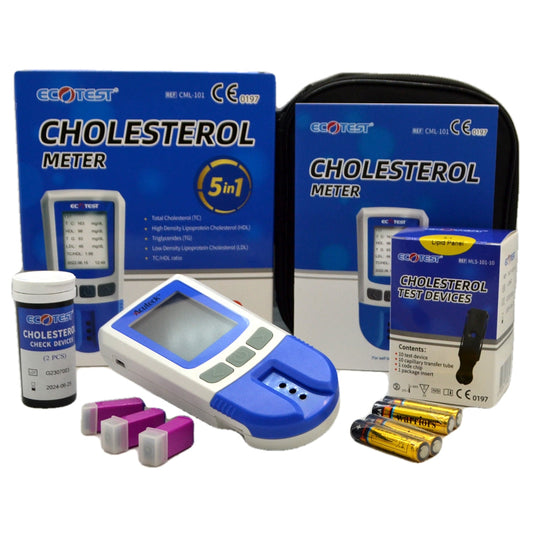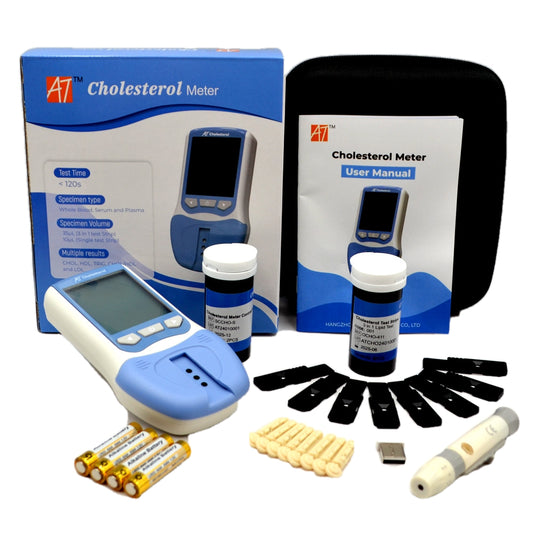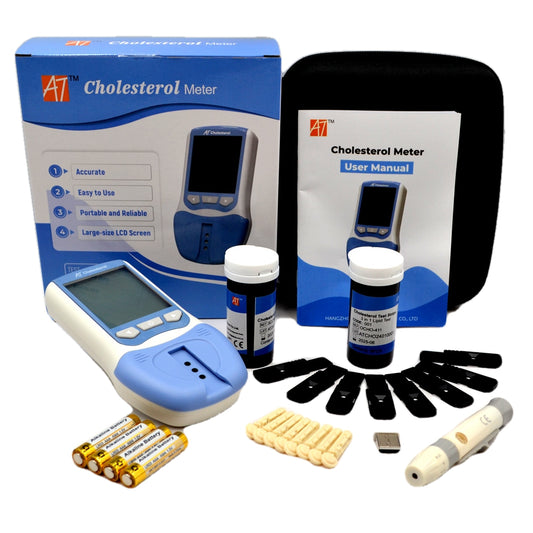Collection: Cholesterol Meters and Cholesterol Test Strips
Cholesterol test kit
We have 4 cholesterol meter and test strip options, including 2 Total Cholesterol meters and 2 Full Lipid Profile Meters measuring Total Cholesterol, HDL LDL & Triglycerides. If you are unsure which cholesterol test kit and cholesterol meter system is best for you, read our guide or watch our video below.
-
EASYLIFE GCU PLUS Blood Glucose / Total Cholesterol / Uric Acid Meter
6 reviewsRegular price From £49.99 GBPRegular priceUnit price / per -
20 x AT 3 in 1 Cholesterol Test Devices for the AT Cholesterol 5 in 1 Meter
No reviewsRegular price From £49.99 GBPRegular priceUnit price / per£69.99 GBPSale price From £49.99 GBPSale -
EASYLIFE GCHb PLUS Blood Glucose / Cholesterol / Haemoglobin Meter
5 reviewsRegular price From £49.99 GBPRegular priceUnit price / per -
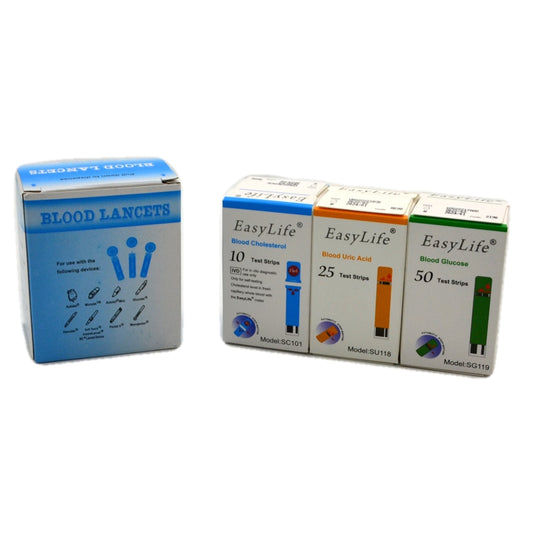
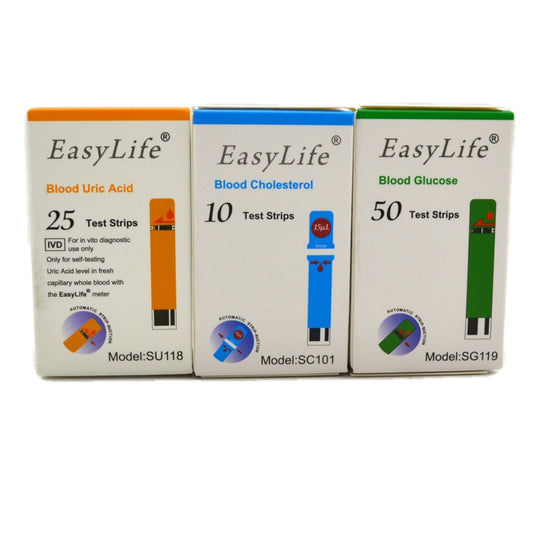
Easylife Test Strips Bundle Pack-50 Glucose / 10 Cholesterol / 25 Uric Acid + 100 Universal Lancets
No reviewsRegular price £46.04 GBPRegular priceUnit price / per£51.52 GBPSale price £46.04 GBPSale -
eB-Tchol Cholesterol Control Solution Pack
No reviewsRegular price £9.99 GBPRegular priceUnit price / per -
Mains Power Supply and Data Transfer Cable for the AT Cholesterol 5 in 1 Meter
No reviewsRegular price £19.99 GBPRegular priceUnit price / per -
Easylife PLUS Test Strips Bundle Pack-50 Glucose, 10 Cholesterol, 25 Haemoglobin
1 reviewRegular price £47.99 GBPRegular priceUnit price / per -
Easylife Plus Test Strips 25 Glucose / 10 Cholesterol / 25 Uric Acid Test Strips Combo Pack
No reviewsRegular price £39.99 GBPRegular priceUnit price / per£42.48 GBPSale price £39.99 GBPSale -
Easylife Glucose / Cholesterol / Uric Acid Strips Combo Pack + 100 Universal Lancets
No reviewsRegular price £41.99 GBPRegular priceUnit price / per£47.47 GBPSale price £41.99 GBPSale -
Easylife Test Strips Blood Glucose / Cholesterol / Haemoglobin Combination Pack
No reviewsRegular price £45.99 GBPRegular priceUnit price / per£48.13 GBPSale price £45.99 GBPSale -
Easylife (Plus) 25 Glucose / 10 Cholesterol / 25 Haemoglobin Strips Combo Pack
No reviewsRegular price £39.99 GBPRegular priceUnit price / per£42.48 GBPSale price £39.99 GBPSale -
10 EcoTest Cholesterol Test Strips + Lancets + Pipettes (Ecotest cholesterol meter required to use these)
6 reviewsRegular price £39.99 GBPRegular priceUnit price / per£39.99 GBPSale price £39.99 GBP -
10 Spare Safety Lancets + Pipettes for use with EcoTest Cholesterol Test Devices
2 reviewsRegular price From £4.99 GBPRegular priceUnit price / per -
10 EcoTest Cholesterol Test Devices + Pipettes + 50 lancets + Lancing Device
No reviewsRegular price £35.99 GBPRegular priceUnit price / per -
EASYLIFE PLUS Blood Total Cholesterol Test Strips
15 reviewsRegular price From £18.99 GBPRegular priceUnit price / per -
eB-Tchol Total Home Cholesterol Meter + 10 Cholesterol Tests
11 reviewsRegular price £39.99 GBPRegular priceUnit price / per -
5 EcoTest Cholesterol Test Devices Lancets + Pipettes Special Offer Expiry End September 2025 (Ecotest cholesterol meter required to use these)
No reviewsRegular price £5.99 GBPRegular priceUnit price / per -
eB-Tchol 10 Total Cholesterol Tests Refill Pack
8 reviewsRegular price From £18.99 GBPRegular priceUnit price / per -
EcoTest 5 in 1 Home Cholesterol Meter + 10 Home Cholesterol Tests
13 reviewsRegular price £142.95 GBPRegular priceUnit price / per -
EcoTest 5 in 1 Cholesterol Meter + 50 Cholesterol Test Devices
1 reviewRegular price £289.99 GBPRegular priceUnit price / per -
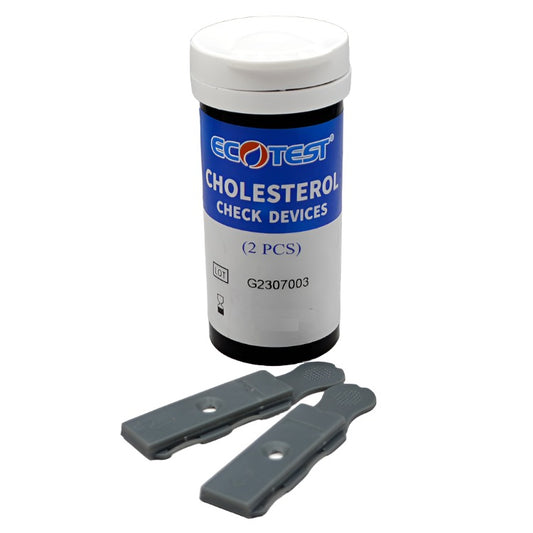
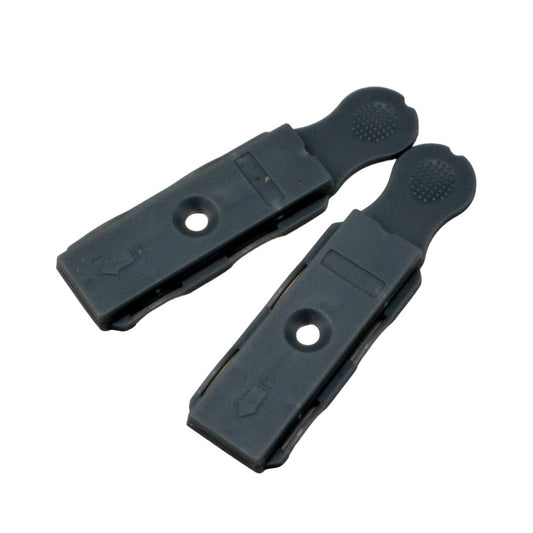 Sold out
Sold out2 EcoTest Check Devices
No reviewsRegular price £4.99 GBPRegular priceUnit price / per -
AT Cholesterol 5 in 1 Meter + 8 Cholesterol Tests by Valuemed
No reviewsRegular price £139.99 GBPRegular priceUnit price / per
Cholesterol test at home
These self-testing meters and devices enable accurate cholesterol level testing in the blood, that all allow you to test your cholesterol at home. They are also suitable for professional use. The cholesterol testing devices work by using a small amount of blood from a fingerstick to measure the levels of total cholesterol.
Choosing a home cholesterol test kit and meter
We hope you find this video helpful in helping you decide which cholesterol testing machine and test kit best suits your needs. If you don't have time to watch the video in which we discuss the differences between them, there is more information below.
Which is the easiest to use cholesterol machine test at home?
The Easylife cholesterol meters are the easiest cholesterol machine test to use at home. The EasyLife meters stand out in the UK as a reliable, affordable, and user-friendly home cholesterol testing solution. Their combination of clinical certification, multi-functionality, and clear, fast results, supported by glowing reviews and low ongoing costs and affordable replacement test strips, make them the top choice for conscientious home cholesterol and health monitoring in the UK.
How does a home cholesterol test kit work?
There are two main types of cholesterol meter and test strips to choose from including simple total cholesterol, or a complete HDL LDL Triglyceride and ratio testing. All are small handheld devices that are battery-powered and have a digital display screen. They have to be used with cholesterol test strips, which are small pieces of paper or plastic that are coated with a chemical that reacts with cholesterol in the blood. The user inserts the cholesterol test strip into the cholesterol meter and pricks their finger to obtain a small drop of blood, which is then placed onto the test strip. The meter then measures the amount of cholesterol in the blood and displays the result on the screen. To get an accurate result with any of the home cholesterol test kits, you must first obtain a good blood sample from the finger prick.
Who are home cholesterol tests suitable for?
Cholesterol meters and strips are often used by people who want to monitor their cholesterol levels at home. It is important to note that these devices should not be used as a substitute for professional medical advice and treatment. If you are concerned about your cholesterol levels, you should consult with your healthcare provider who can perform a more comprehensive cholesterol test and provide guidance on how to manage your cholesterol levels.
They are also very useful tools for individuals who are already known to have abnormal cholesterol levels, and who wish to monitor their cholesterol levels at home, and see how they respond to dietary changes.
Which is the best cholesterol meter and test kit?
Our range of Cholesterol test kits and meters can be sorted into:
- Total Cholesterol Tests (eBTcho, EasyLife) Total Cholesterol tests cost less per test and are fine for general screening for raised cholesterol levels in blood and for monitoring normal cholesterol levels. You can screen total cholesterol at any time of day.
- Differential Cholesterol Tests (EcoTest 5 in 1 cholesterol meter) This is the best cholesterol meter if you want a more detailed breakdown of your cholesterol and lipid levels as it measures Total Cholesterol (TC) , High Density Lipoprotein (HDL) and Triglycerides (TG) and then the meter calculates the ratio of Total Cholesterol (TC) to HDL and Low-Density Lipoprotein Cholesterol (LDL) so 5 results are given on every blood sample. It is an ideal choice if you are monitoring elevated total cholesterol levels and/or high Triglyceride levels. If you have elevated Cholesterol, or are on diet modifications or medication to treat elevated cholesterol, our advice would be to buy the 5 in 1 EcoTest system, which will measure the full blood lipid profile and will give you far more detailed information about your cholesterol levels.
Collapsible content
What is a cholesterol test kit?
A cholesterol test kit is a home diagnostic tool designed to measure the levels of cholesterol in your blood. It typically includes test strips, a lancet for blood collection, and a device (cholesterol meter) to analyse the blood sample.
Why should I use a cholesterol test kit?
Cholesterol test kits offer convenience, allowing you to check your cholesterol levels at home without visiting your doctor or a healthcare facility. Regular monitoring is essential for individuals with a history of high cholesterol or those on cholesterol-lowering medications.
It's often recommended for regular monitoring of cholesterol levels, especially if you have a family history of heart disease or if you're managing your cholesterol through lifestyle changes or medications.
How do cholesterol test kits work?
A cholesterol test kit is a home diagnostic tool designed to measure the levels of cholesterol in your blood. It typically includes test strips, a lancet for blood collection, and a device (cholesterol meter) to analyse the blood sample.
These home cholesterol kits usually use a small blood sample, often obtained through a fingerstick. The blood is applied to a test strip, which. is then inserted into the meter which analyses the sample to provide blood cholesterol level readings.
Are home cholesterol tests accurate?
While home cholesterol test kits can provide reasonably accurate results, they may not be as precise as laboratory tests. Factors such as user error, sample collection, and test kit quality can influence accuracy.
Should I do a fasting or non-fasting cholesterol test?
If your Total Cholesterol levels are in the normal range there is usually no need to test after fasting.
However, if your results indicate an elevated total cholesterol or high level of Triglycerides, over 1.7 mmol/L, then it is best to move to cholesterol testing after fasting for between 9 and 12 hours. This can easily be achieved by not eating after 7 pm and testing first thing the following morning.
How to interpret your cholesterol test results
Cholesterol Test Results
Some of the Cholesterol meters just displaty total cholesterol and some display 5 results for each completed blood test. Results are displayed in one of 2 scale options you can select, mmol/L or mg/dL. In the UK most cholesterol level results will be given in mmol/L.
Total Cholesterol
A normal Total Cholesterol level is below 5.0 mmol/L (200mg/dL) Above 5.0 but below 6.18 mmol/L is considered borderline elevated. Above 6.20mmol/L is considered high.
A high total cholesterol level can increase your risk of cardiovascular disease. However, decisions about when to treat high cholesterol are usually based upon the level of LDL or HDL cholesterol rather than the level of total cholesterol.
Total cholesterol levels can be tested at any time of day but the LDL and Triglyceride levels can vary depending on what has been recently eaten. For this reason, fasting (9-12hr) total cholesterol measurement is preferred by most doctors where either of the above two is elevated.
HDL
HDL or High-Density Lipoprotein is a good element and levels of over 1.55mmol/L (60mg/dL) are excellent. Levels between 1.00 mmol/L and 1.55 mmol/L are normal. Below 1.0 mmol/L are unhealthy. Men tend to have lower HDL levels than women 1 versus 1.2 mmol/L an ideal to aim for is 1.4 mmol/L
LDL
LDL or Low-Density Lipoprotein Cholesterol often referred to as bad cholesterol increases cardiovascular disease risk and Levels should be kept below 3.0 mmol/L
Triglycerides
High triglyceride levels are also associated with an increased risk of cardiovascular disease.
Triglyceride levels are assessed as follows:
●Normal – Less than 1.7 mmol/L (150 mg/dL)
●Mildly increased – 1.7 to 5.6 mmol/L (150 to 499 mg/dL)
●Moderately increased – 5.6 to 10 mmol/L (500 to 886 mg/dL)
●Very high – Greater than 10 mmol/L (886 mg/dL)
If your Cholesterol levels are abnormal we can not give personal or medical advice, so please discuss the findings with your Doctor, Nurse, or Pharmacist.
Are there any medical conditions which would prevent me getting accurate cholesterol results?
Yes there are a few medical conditions and drug supplements that can interfere with your cholesterol test results.
Please consider the following if you are not getting consistent or accurate readings with your cholesterol meter:
- High dose Vitamin C. Ascorbic Acid supplements, often as part of multivitamins or taken on their own will interfere with results. If they are not prescribed and it is possible to stop taking Vitamin C in high dose, cholesterol testing can be resumed after 7 days.
- High Bilirubin levels in the blood will interfere with cholesterol test results. The level may be below that required to cause clinical jaundice. Raised bilirubin levels in the blood can occur in many medical conditions including anaemia, cirrhosis, following a blood transfusion, Gilbert syndrome—a common, inherited condition in which there is a deficiency of an enzyme that helps break down bilirubin, viral hepatitis, gall bladder disease, as a reaction to drugs (including statins) and in alcoholic liver disease.
- High urate levels can result from renal disease and early kidney failure but can also be caused by many other things including dehydration, diuretics (water retention relievers), drinking too much alcohol, drinking too much soda or eating too much of foods that contain fructose, a type of sugar, high blood pressure (hypertension), Immune-suppressing drugs, Leukemia.
- Haemolysis, the breakdown of large numbers of blood cells. Routinely follows a blood transfusion, but can also occur after trauma, surgery, and in a range of blood and bone marrow diseases.
With the exception of Vitamin C and prescribed drugs, most of the above will require medical investigation to confirm the underlying cause, but is worth considering if the cholesterol meter check device test is normal and the lancing technique, sample collection, and procedure are all correct. Please just don't blame the meter, or ignore the results, the problem may in fact be you! It could be something that you are taking or that you have an underlying medical condition that you may be completely unaware of!
Can you give me any tips on obtaining the finger prick blood sample?
Obtaining a good finger prick blood sample is crucial to getting accurate results with any home blood test. We have created a video for each product which shows a great demonstration of exactly how you should be using the lancets and test provided, and the prep needed to perfuse the fingers.
We have put together our top tips on performing a finger prick blood test to help you here
Can you use a lancet without an auto lancing device?
A lancet can be used alone or with a lancing device. Many people find it easier to obtain a finger prick blood sample if they use the lancet in a lancing device.
Most of our meters are supplied with starter packs of lancets and some with safety lancets. We suggest you continue to use the same lancets recommended by the manufacturer if possible. If you are struggling to get adequate samples move to a thicker lance, ie 21g is thicker than 28g or 30g (the thinnest)
How do I know if the cholesterol meter is accurate ?
While learning to use the cholesterol meter it is not uncommon for results to vary considerably between tests.
Here is a list of tips on getting consistently accurate results from your cholesterol meter:
1) Always lance the side of the finger, never the flat surface or pulp. The side of the finger is far more vascular and bleeds profusely. Wipe the first drop away and allow a large second drop to form naturally, without squeezing the finger. This technique is critical in getting accurate results. A bad lance technique is the main cause of wildly fluctuating results.
2) Dont expect the total cholesterol levels to be the same each time. Cholesterol levels have a diurnal variation and are naturally dynamic, see 3.
3) If your Triglyceride level is above 1.7mmol/L then you should move to testing while fasting as the Triglyceride levels will vary with meals and significantly affect the other readings on your meter.
4) You can check the meter function using one of the Test Devices supplied with the original meter starter pack. We have embedded a video demonstration of a device test in the product listing above.
5) Exclude medical and medication causes for the unexplained results, see below..
Is the test painful?
No, the home test is not painful. The test involves a simple finger-prick to collect a small blood sample, similar to what is done for a blood glucose test, so you do need to be comfortable with pricking your finger to obtain the blood samples.
You use a sterile lancet to make a tiny puncture on your fingertip. Most people describe the sensation as a quick, mild pinch or prick that only lasts a moment. The lancet is designed to minimise discomfort.
If you are concerned about the process, you can warm your hands before the test to improve blood flow and reduce any discomfort further.

